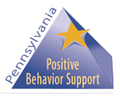Overview of Positive Behavior Interventions and Supports (PBIS)
 Positive Behavior Interventions and Supports (PBIS) is a proactive, multi-tiered approach to discipline that promotes appropriate student behavior and increased learning. Traditionally, models of school discipline tend to be reactive (i.e., student misbehavior results in punitive consequences). The word “approach” is key in that PBIS provides direction and a decision-making framework for developing a comprehensive system of behavior support tailored to individual program and school needs. The system is based upon a three-tiered model. The first tier (universal) serves as the foundation upon which the other two tiers are built. This tier provides a system of supports to all students in a school based on preventative practices which emphasize teaching and reinforcing expected student behaviors. Tier two (secondary) provides targeted interventions to support students classified as “at risk,” who require more intervention than is typically provided within tier one universal support. Supports offered in tier three (tertiary) require the most intensive level of intervention for students with the most significant behavioral/emotional support needs.
Positive Behavior Interventions and Supports (PBIS) is a proactive, multi-tiered approach to discipline that promotes appropriate student behavior and increased learning. Traditionally, models of school discipline tend to be reactive (i.e., student misbehavior results in punitive consequences). The word “approach” is key in that PBIS provides direction and a decision-making framework for developing a comprehensive system of behavior support tailored to individual program and school needs. The system is based upon a three-tiered model. The first tier (universal) serves as the foundation upon which the other two tiers are built. This tier provides a system of supports to all students in a school based on preventative practices which emphasize teaching and reinforcing expected student behaviors. Tier two (secondary) provides targeted interventions to support students classified as “at risk,” who require more intervention than is typically provided within tier one universal support. Supports offered in tier three (tertiary) require the most intensive level of intervention for students with the most significant behavioral/emotional support needs.
This three-tiered approach does not require less effort than current, non-PBIS practices, but it channels and focuses school-based efforts, making them more efficient and effective.
Characteristics of PBIS:
-
Interventions are planned and positive rather than reactive and punitive
-
Conditions (antecedents) contributing to inappropriate behavior are carefully managed or eliminated
-
Multiple opportunities for positive, corrective feedback are created while negative critical feedback is limited or eliminated
-
Prosocial behaviors are taught directly, practiced frequently, and routinized so that they become automatic
Research supports that a positive, direct instructional approach is more effective than traditional punishment-based alternatives in improving student academic success and improving overall school climate (Horner, 2000; Myers, 2001).
PBIS approaches are as varied as the schools in which they are applied. The approach adopted by the Bureau of Special Education/Pennsylvania Training and Technical Assistance Network (PaTTAN) was developed by Rob Horner, George Sugai, and others associated with the University of Oregon. This research-based approach is recognized nationally and is supported by the federally funded Positive Behavioral Interventions and Supports Technical Assistance Center (www.pbis.org).
It is important to realize that the PBIS approach is structured to provide a blueprint to support all students in a school, from the most compliant to those requiring the most intensive supports. This approach:
-
is research based;
-
promotes accountability and sustainability through data collection and planned, well-articulated individual building to district level structures; and
-
fosters school-community partnerships at all levels.
Furthermore, the SWPBS model conceptually aligns with Pennsylvania’s Multi-Tiered Systems of Support framework.
PBIS is a means of reducing non-academic barriers to student achievement. PBIS can help significantly in maximizing the time students are engaged in relevant learning tasks. Time “off task” is not only unpleasant for staff but also decreases time for instruction; therefore, an approach to school discipline (e.g., PBIS) which maximizes learning time is of tremendous value to schools or districts seeking the proficient level of academic achievement for all students. Research has shown that changes such as:
-
differentiated instructional practices;
-
improved instructional delivery;
-
consistent, nonpunitive discipline practices;
-
opportunities to learn prosocial and self-management skills;
-
consistent, clear rules and high-performance expectations; and
-
consistent enforcement of rules
-
contribute to high achievement and prosocial behavior in children and adolescents. (Colvin, Kameenui, & Sugai, 1993; Mayer, 1995; Walker and Sprague, 1995).
The PBIS approach provides a continuum of prevention and intervention supports at each of the three tiers: universal (for all students), secondary (for students at risk), and tertiary (for students with intensive needs). At the tertiary level, PBIS embraces the conceptual approaches of wraparound and/or person-centered planning for students who have challenging behavioral needs requiring intensive support.